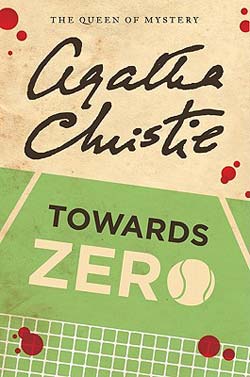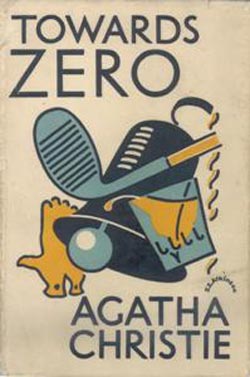 I’ve always been an indiscriminate reader. Growing up, I wasn’t surrounded with a wealth of reading material so I read whatever I could lay my hands on. I never had the luxury of considering myself a genre reader or even the inclination: satisfying the urge to read, no matter what the material, was paramount. And so I enjoyed a wide range of content, never developing a real favorite, till I turned 14, discovered Agatha Christie and became a die-hard fan of the genre her writing exemplifies.
I’ve always been an indiscriminate reader. Growing up, I wasn’t surrounded with a wealth of reading material so I read whatever I could lay my hands on. I never had the luxury of considering myself a genre reader or even the inclination: satisfying the urge to read, no matter what the material, was paramount. And so I enjoyed a wide range of content, never developing a real favorite, till I turned 14, discovered Agatha Christie and became a die-hard fan of the genre her writing exemplifies.
I had, of course, enjoyed mysteries before then: what English-reading child of the late 20th century hasn’t read a Nancy Drew, Hardy Boys, or Famous Five? But I enjoyed these books as I enjoyed any other quality series, as dependable sources of entertainment. In addition, they provided tidy conclusions to seemingly difficult problems, allowing me the same pleasure I found in mathematics. I could not claim either to be a favorite subject, though, as I felt little emotional investment. Worse, when I was 9, I first encountered Sherlock Holmes and found the entire experience disappointing. The detective’s personality was tedious and the outcomes of his investigations unlikely. (If you have to make up an animal as a vector for murder then, to my young mind, you have failed an essential test of logic.) This, I thought, meant that I hadn’t the necessary stuff to be a true crime fiction fan, if I could care so little for one of the proclaimed eminences of the field.
So when a friend loaned me Agatha Christie’s Towards Zero, I expected to be entertained but little more. I knew of her reputation, but had also heard similar and to me overrated claims of Arthur Conan Doyle. On the bus home from school, I finally cracked open the book. I wound up reading it straight through tea-time, and finished it kneeling by a window as the sun set, loath even to walk across the room and lose any precious reading time by turning on the lights. I was electrified by the realization that a mystery novel could be this good, and this compelling.
Towards Zero is, first and foremost, terrifically written. A seaside town draws in several people whose relationships come straight out of a soap opera, yet the characterization is never stock nor melodramatic, even when one particularly troubled soul tries to leap from a cliff (in one of my favorite pieces of writing in the book). Since this is an Agatha Christie novel, someone is murdered, and the quest to unravel the truth and identify the killer is well-conceived and executed. But for my very first time reading a mystery, the outcome of the investigation mattered. Nancy Drew might get into scrapes, but I never felt that she was truly in danger, or that whatever she was investigating was a matter of life or death. Sherlock Holmes viewed his cases with an almost amused detachment: how then could I care if he would not? The emotion in Ms. Christie’s writing, however, was palpable. People were struck down or framed for murder in a cold calculation that sprang, I would discover as I read on, from turbulent, destructive emotion. Not only the dead could be victims.

Granted, not every one of her novels is so straightforward, or even first-rate. Ms. Christie had a tendency to repeat certain motifs, and reading Endless Night before The Murder Of Roger Ackroyd, for example, was a huge mistake. But books like Towards Zero and Crooked House and And Then There Were None made me understand that a good mystery novel isn’t just about logic and puzzles, but also about the people involved, the survivors, and how a death affects those around it. Ultimately, murder mysteries are about finding closure to a difficult (and, if presented correctly, emotional) problem and moving on.
Throughout the decades since first discovering this, I’ve come to rely on mystery novels to provide a soothing microcosmic example of order that my own sometimes chaotic life could do well to take a metaphoric page from (without the hideous disruption of a death, of course). So every few books, I deliberately queue up an honest-to-goodness mystery novel in order to help cleanse my literary palate and reset my brain for what’s to come. Not every book since that year of reading Christie has been a winner, but each one has been a reassuring reminder that there is an order to things if only we are intelligent about it. Justice doesn’t always prevail, but the survivors manage to make some sort of peace and go on. Agatha Christie’s Towards Zero was the first book to make me understand that viscerally instead of just intellectually, and is the reason I’m a fan of the murder mystery novel to this day.
Doreen Sheridan is a freelance writer living in Washington, D.C. She
microblogs on Twitter @dvaleris.
Read all posts by Doreen Sheridan for Criminal Element.

Well put. Mysteries serve a simillar purpose in my reading life. I like the ones that offer some closure and some sense of ‘moving on’ at the end.
When I read Towards Zero for the first time, I didn’t grasp all the nuanses about the other victims of a crime. It took a few re-reads for me to realize that the real crime was the frame job and that victims could be those others than the corpse. Ms. Christie brought up this point very well in The Tuesday Club Murders, when Miss Marple talked about the people who suffer if the truth isn’t revealed, even if justice is not met.
Thank you! I think another novel of hers that also does a good job on the theme of one crime ruining the members of a community is The Moving Finger. I hadn’t had much exposure to grittier mysteries at the time (and even if I had, would probably have considered the events too unlikely to happen to me) but I could whole-heartedly sympathize with the unrest caused by a single malevolent soul.